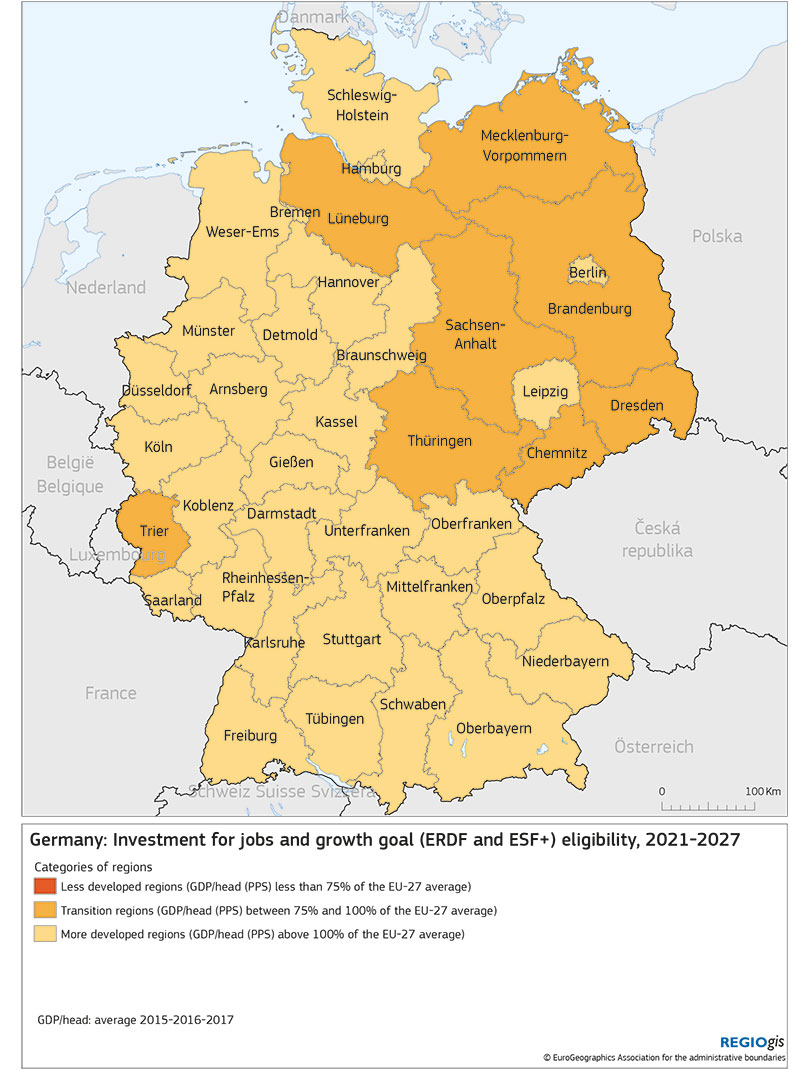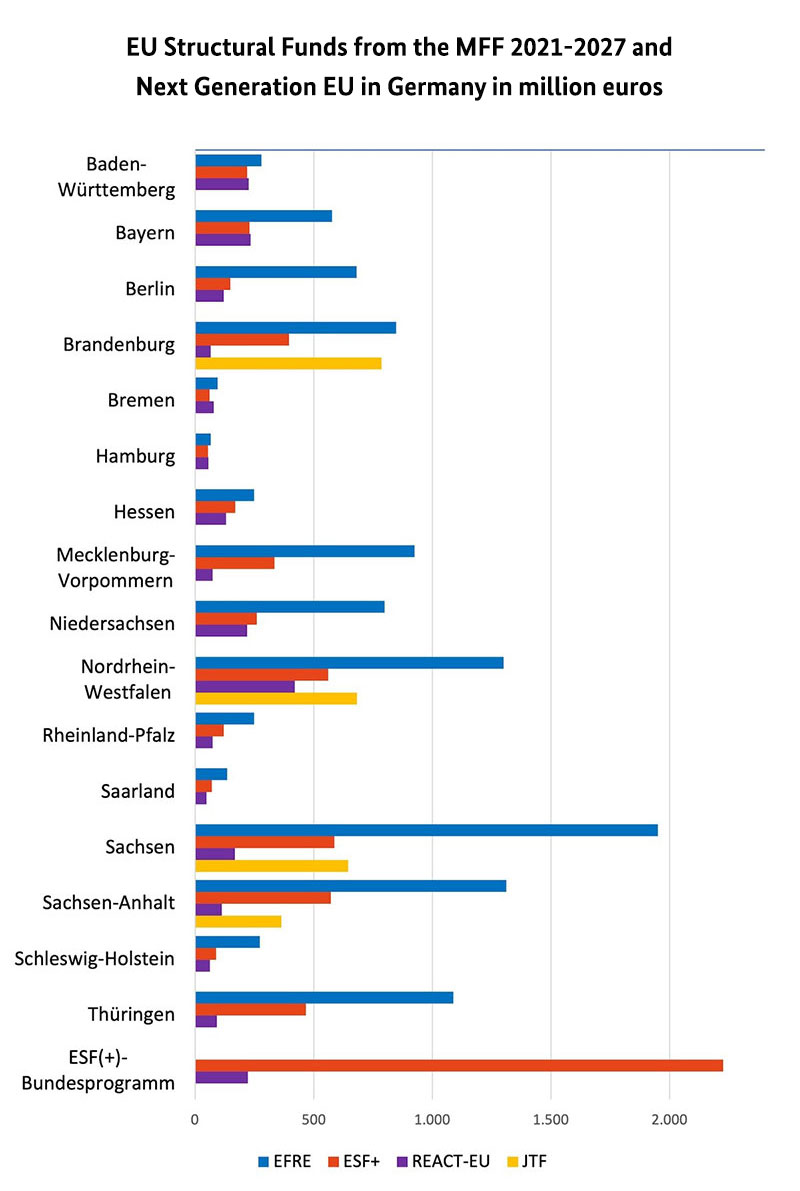The ESF Plus Federal Programme (2021-2027)
The ESF Plus Federal Programme describes the overall strategy of the Federal Government for the implementation of the European Social Fund Plus (ESF Plus) in the funding period 2021-2027 in Germany.
In order to implement the objectives of the ESF Plus in Germany, the Federal Government has drawn up the ESF Plus Federal Programme 2021-2027. The Federal Programme describes the strategy for the ESF Plus-funded federal funding measures. The ESF Plus Federal Programme includes specific funding objectives, planned funding priorities and activities, expected results, financial plans and output and result indicators to measure the achievement of the funding. The legal requirements for the structure and content of the ESF Plus Federal Programme are defined in Article 22 of Regulation (EU) 2021/1060. In accordance with these requirements, the ESF Plus Federal Programme 2021-2027 contains in particular the following content:
- Programme Strategy (Chapter 1): Presentation of the overall strategy along identified funding needs with regard to the implementation of the European Pillar of Social Rights and taking into account the country-specific recommendations 2019, the Partnership Agreement, the 2019 and 2020 National Reform Programmes and national strategies
- Priorities (Chapter 2): Description of planned funding priorities, specific objectives, types of actions as well as output and result indicators
- Financial plans (Chapter 3)
- Partnership (Chapter 6): Process of involvement of the partners
The following federal ministries have developed and implemented the ESF Plus federal programme:
- Federal Ministry of Labour and Social Affairs (lead administrative authority)
- Federal Ministry of Education and Research
- Federal Ministry for Family Affairs, Senior Citizens, Women and Youth
- Federal Ministry for Economic Affairs and Climate Action
- Federal Ministry of Housing, Urban Development and Building
Participation of partners
In preparation for the 2021-2027 funding period, the Federal Ministry of Labour and Social Affairs (BMAS) developed proposals to simplify ESF funding. This resulted in the BMAS Initiative for Lean Fund Management and the Conference on the Future of the European Social Fund (ESF) post 2020. 150 key actors and partner organisations participated in the subsequent survey on the future of the ESF. The BMAS was able to successfully bring the proposals of the Lean Fund Management Initiative into the negotiations at EU level on the legal framework for the 2021-2027 funding period.
The concrete planning for the ESF Plus Federal Programme started in summer 2019 with an online public consultation on the future funding priorities of the Federal Government. The consultation involved more than 1,500 citizens and representatives of civil society organisations and social partners. The results of the online consultation were discussed at a public consultation event on 22 October 2019 and constituted a significant milestone in the development of the federal ESF Plus strategy for the funding period 2021-2027.
In the further process, the future priorities and support measures were further concretised and coherently designed in coordination at federal level and with the Federal States. As part of the process, the ESF Monitoring Committee was regularly informed of the votes. On 5 May 2022, the European Commission approved the ESF Plus Federal Programme as the first ESF Plus Programme in the EU.
Coordination with the Federal States
The Federal Government and teh Federal States have closely coordinated with each other in terms of programming for the ESF Plus funding period. This is intended to avoid duplication of content and double funding and to ensure interlocking holistic ESF Plus funding in Germany.
Financial resources in the funding period 2021-2027
As a result of the positive development of the economy and the labour market, Germany receives around 17.4 billion euros in traditional structural funds (ERDF and ESF Plus) (funding period 2014-2020 19.3 billion euros). The funds will be complemented by additional Structural Funds from the new Just Transition Fund (JTF) of around 2.5 billion euros. The REACT-EU funding of 2.4 billion euros also available for Germany under the Multiannual Financial Framework (MFF) 2021-2027 relates exclusively to the 2014-2020 funding period.
Of the Structural Funds for the 2021-2027 funding period, the ESF Plus accounts for around 6.56 billion euros. The funds are distributed among the regions as follows:
- More developed regions (see map: old federal states incl. regions of Leipzig and Berlin, excluding the Lüneburg and Trier regions: 3.41 billion euros (52%)
- Transition regions (see map: new Länder incl. regions Lüneburg and Trier without regions Leipzig and Berlin: 3.15 billion euros (48%)

The Federal Government and the Federal States continue to manage ESF Plus funds separately. The Federal Government share of the ESF Plus Federal Programme amounts to around 2.2 billion euros ESF Plus funding (34%). The remaining ESF Plus funds of around EUR 4.34 billion euros (66%) are managed by the Federal States.
